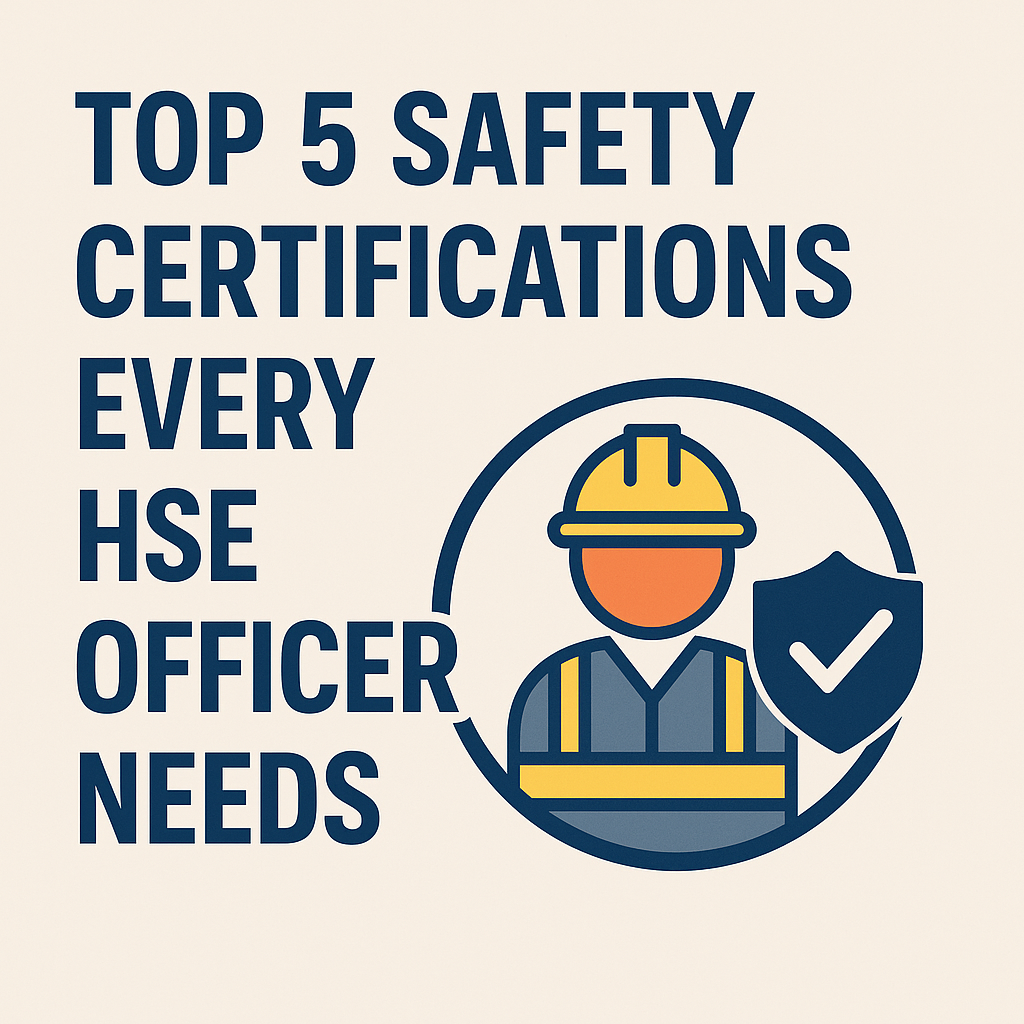
Top 5 Safety Certifications Every HSE Officer Needs
If you’re stepping into the world of Health, Safety, and Environment (HSE), there’s one thing you can’t ignore—certifications. These aren’t just papers with fancy stamps; they’re your ticket to better jobs, higher salaries, and greater respect on-site. Whether you’re new or already working in safety, upgrading your credentials is a game-changer.
Understanding the Role of an HSE Officer
Being an HSE Officer isn’t just about wearing a helmet and ticking checklists. You’re the guardian of workplace safety, ensuring compliance, identifying hazards, and driving a safety culture. Certifications back up your skills with authority and prove you’re serious about safety.
Top 5 Safety Certifications Every HSE Officer Needs
1. NEBOSH IGC (International General Certificate)
Overview:
NEBOSH IGC is one of the most recognized health and safety qualifications in the world. It sets the foundation for understanding workplace risks and controls.
Who Should Take It?
Anyone aspiring to work in safety, particularly in oil & gas, construction, or manufacturing sectors.
Course Content:
- IG1: Management of Health and Safety
- IG2: Risk Assessment
Benefits:
- Globally recognized
- Pathway to TechIOSH
- A stepping stone to NEBOSH Diploma
Career Boost:
Positions such as HSE Officer, Safety Supervisor, and Safety Manager open up instantly.
2. IOSH Managing Safely
Overview:
IOSH (Institution of Occupational Safety and Health) is a UK-based qualification ideal for line managers and new safety professionals.
What You’ll Learn:
- Risk assessment basics
- Legal responsibilities
- Safety management
Who It’s For:
Perfect for beginners or those looking to understand fundamental safety management concepts.
Why It’s Essential:
It’s often the starting point for professionals before pursuing NEBOSH.
3. OSHA Certification (30-Hour or 10-Hour)
Overview:
The Occupational Safety and Health Administration (OSHA) provides training that focuses on U.S. safety standards but is increasingly recognized internationally.
Differences:
- 10-Hour: For general workers
- 30-Hour: For safety supervisors and managers
Why HSE Officers Need It:
- Globally respected
- Useful for working with U.S.-based clients and multinational projects
4. ISO 45001:2018 Lead Auditor Course
What Is It?
ISO 45001 is the global standard for occupational health and safety management systems. This course trains you to audit and assess compliance.
Key Learning Areas:
- OHSMS structure
- Risk-based thinking
- Audit planning and execution
Why It Matters:
Companies value professionals who can implement and audit ISO systems, making you an invaluable asset.
5. Fire and Safety Diploma (ADIS/PDIS)
Course Overview:
Offered by various Indian institutions, these diplomas cover fire safety, industrial safety, and disaster management.
Practical Uses:
- Fire risk assessment
- Safety drills
- Evacuation planning
Job Titles:
Fire Safety Officer, Safety Supervisor, Emergency Response Team Leader
Bonus Certifications to Boost Your Career
- First Aid & CPR: Life-saving skills that are a must on any site.
- HAZWOPER: For those dealing with hazardous waste or emergency response.
- Confined Space & Scaffolding Safety: Specialized training that can give you an edge.
How to Choose the Right Certification?
Ask yourself:
- Where do I want to work? (Oil & Gas, Construction, Manufacturing?)
- What’s my current qualification?
- What’s my budget and time availability?
Pro Tip:
Start with IOSH or OSHA, then move to NEBOSH and ISO 45001 for advanced roles.
Benefits of Being a Certified HSE Officer
- Better Knowledge of Hazards
- Higher Salary Prospects
- Faster Career Growth
- Global Job Readiness
Certification Providers and Mode of Learning
Top Institutes:
- Green World Group
- NIST
- British Safety Council
- RRC International
- HSE Study Guide (Online)
Online vs Offline:
- Online: Flexible, cost-effective
- Offline: In-person training, exam centers
Cost and Duration Comparison Table
| Certification | Cost (Approx.) | Duration |
|---|---|---|
| NEBOSH IGC | ₹75,000–₹95,000 | 1–3 Months |
| IOSH Managing Safely | ₹20,000–₹30,000 | 3–5 Days |
| OSHA 30-Hour | ₹10,000–₹18,000 | 1 Week |
| ISO 45001 Lead Audit | ₹35,000–₹50,000 | 5–7 Days |
| Fire & Safety Diploma | ₹40,000–₹80,000 | 6–12 Months |
Common Myths About Safety Certifications
- ❌ “They are only for freshers.”
👉 Even seasoned professionals benefit from updated knowledge. - ❌ “Online courses aren’t valued.”
👉 Accredited online training is widely accepted.
Tips for Cracking Safety Certification Exams
- Stick to a daily study plan
- Use practice papers and mock exams
- Focus on real-life examples in answers
- Watch YouTube revision videos
- Don’t just memorize—understand the “why”
Conclusion
Certifications are the heartbeat of a successful HSE career. From NEBOSH to ISO 45001, each qualification polishes your skillset, boosts your confidence, and opens up global opportunities. Don’t settle for mediocrity—get certified, get noticed!
NEBOSH IGC Solved Question Paper 2025 – Download Complete Answer Guide
What are the Highest Marks in NEBOSH?
What is the Next Level After NEBOSH?
FAQs
Q1. Which safety certification is best for freshers?
A: IOSH Managing Safely or OSHA 30-Hour are great starting points.
Q2. Can I do NEBOSH IGC online?
A: Yes, many providers now offer online classes and OBE (Open Book Exam).
Q3. How long does ISO 45001 Lead Auditor training take?
A: Typically 5–7 days with a final examination.
Q4. Are safety certifications valid internationally?
A: Yes, certifications like NEBOSH, ISO 45001, and OSHA are recognized worldwide.
Q5. Is Fire and Safety Diploma necessary for every HSE Officer?
A: Not necessary but highly valuable if you aim for fire-related safety roles.